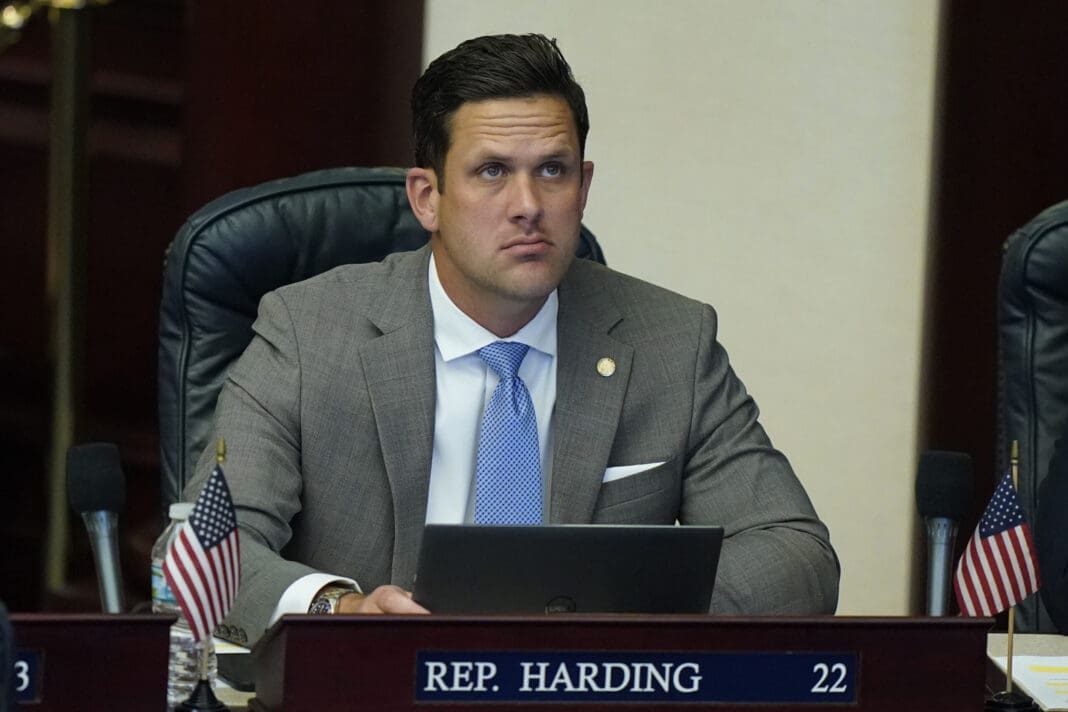Former Florida legislator who sponsored ‘Don’t Say Gay’ law pleads guilty to fraud charges
As Florida Gov. Ron DeSantis pushes to expand anti-LGBTQ policies, the lawmaker behind key anti-LGBTQ legislation is facing decades behind bars for wire fraud and money laundering.

The Florida Republican legislator who introduced the bill that eventually became the state’s controversial “Don’t Say Gay” law pleaded guilty this week to charges related to a COVID-19 relief funds fraud case earlier this week.
The U.S. Attorney for the Northern District of Florida charged former state Rep. Joseph Harding with fraudulently obtaining $150,000 in Small Business Administration loans by submitting a falsified SBA Economic Injury Disaster Loan application on behalf of one of his dormant business entities.
In an appearance before a federal court in Gainesville, Florida, on Tuesday, Harding pleaded guilty to one count each of wire fraud, money laundering and making false statements. The former state lawmaker is set to return to court on July 25 for a sentencing hearing. He faces a maximum of 35 years in prison, including up to 20 years for the wire fraud charge.
“Court documents reflect Harding devised a scheme to defraud the Small Business Administration (SBA) and obtained coronavirus-related small business loans by means of materially false and fraudulent pretenses, representations, and promises, and while executing such scheme, caused wire communications to be transmitted in interstate commerce,” the U.S. Attorney’s Office said in a press release.
After obtaining the loan money, Harding allegedly made three transactions involving more than $10,000 — one to move money over to his joint bank account, one to make a payment on his credit card, and one to transfer funds to a third-party business entity’s account.
A grand jury returned an indictment for Harding in the relief funds fraud case on Dec. 7, 2022. He resigned from his seat in the Florida House of Representatives the next day.
Harding represented the 22nd District in the Florida state House for just over two years, from November 2020 until his resignation. He is perhaps best known for introducing the bill that would become the Florida Parental Rights in Education Act, commonly referred to as the state’s “Don’t Say Gay” law.
The law bans classroom instruction on sexual orientation and gender identity from kindergarten through third grade in public schools. The law’s critics contend it is too broad and has had a chilling effect on any discussion of LGBTQ identities, silencing students’ ability to talk about LGBTQ parents and the removal of books that could be construed as relating to gender and sexuality.
Florida Gov. Ron DeSantis’ administration has signaled it wants to expand the “Don’t Say Gay” Law to all grades in the state. The change, proposed by the state’s Department of Education, would prohibit instruction on sexual orientation and gender identity up to 12th grade unless required by existing state standards or as part of optional reproductive health instruction.
The proposal does not need to go before the state Legislature, and only requires the approval of the state Board of Education, which is appointed by the governor. The DeSantis administration’s new proposal is scheduled for a Board of Education vote next month.
Published with permission of the American Independent Foundation.
Recommended

Biden calls for expanded child tax credit, taxes on wealthy in $7.2 trillion budget plan
President Joe Biden released his budget request for the upcoming fiscal year Monday, calling on Congress to stick to the spending agreement brokered last year and to revamp tax laws so that the “wealthy pay their fair share.”
By Jennifer Shutt, States Newsroom - March 11, 2024
December jobs report: Wages up, hiring steady as job market ends year strong
Friday’s jobs data showed a strong, resilient U.S. labor market with wages outpacing inflation — welcome news for Americans hoping to have more purchasing power in 2024.
By Casey Quinlan - January 05, 2024
Biden’s infrastructure law is boosting Nevada’s economy. Sam Brown opposed it.
The Nevada Republican U.S. Senate hopeful also spoke out against a rail project projected to create thousands of union jobs
By Jesse Valentine - November 15, 2023









































































